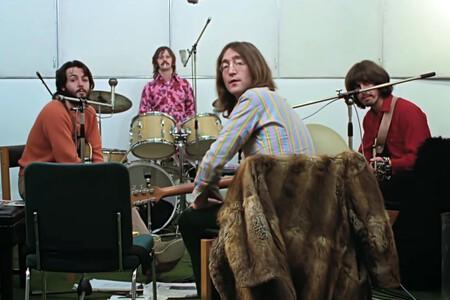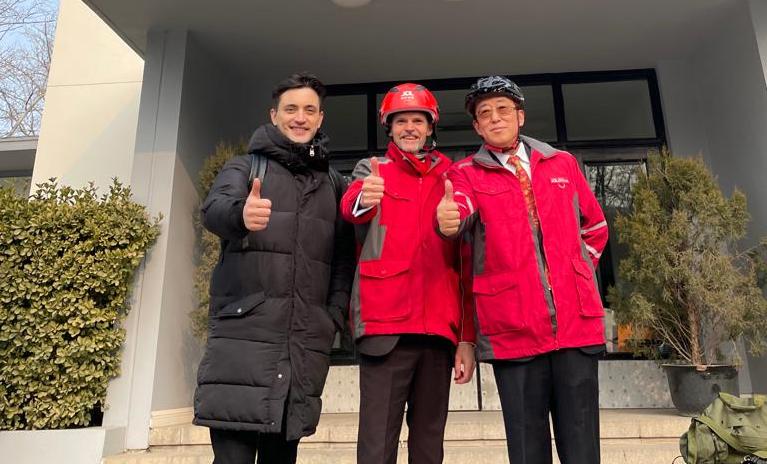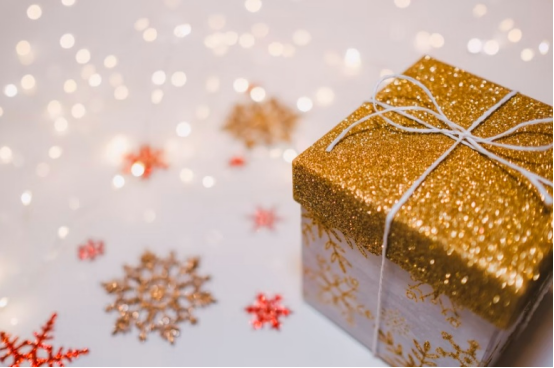Most Read About "Get Back" by Peter Jackson Today's Most Read Comments
"Larger than life" is an English expression that, according to my humble understanding, reflects the elusive, what cannot be contained in any way, leaving us with perplexity, astonishment or enrapture as the only possible response to the fact that one has just experienced .
This is what happens to many of us who have lived a large part of our lives chasing the utopia of understanding the Beatles phenomenon in all its details, after seeing Peter Jackson's encyclopedic and monumental Get Back. What the New Zealand director has achieved is epic: he rethinks everything we have previously learned about the Fab Four and asks us to modify many of the hitherto irrefutable truths of the Beatle catechism.
We are thus before the reform of an entire dogma. Jackson is the Martin Luther who has taken advantage of the pandemic to dive into the depths of Let It Be with its 55 hours of film and 140 hours of audio, rescued from that cumbersome process that recorded nothing less than the beginning of the end of the wonderful dream. who shared humanity with four daring boys from the city of Liverpool in the 1960s.
It is that until now, for the vast majority, this story was always told by others. For those who supposedly were close. For those who had access to the data, those who spoke with those who were close to the impregnable perimeter of the Inner Circle, but we never imagined having a camera and a microphone open for so long, in the midst of the ups and downs of a recording that took a large part of the month of January 1969, just 7 years after the publication of the first LP and 5 short years after the start of the wild beatlemania, from the United States to the world, in 1964.
Directed by the eccentric Michael Lindsay-Hogg, biological son of Orson Welles and creator of the Rolling Stones' Rock and Roll Circus, the official version of Let It Be ended up being a sad farewell to the Beatles on celluloid. As a result of the problems that would ensue later – but that were already brewing in the offices of lawyers and record executives – the tape obtained a disappointing final cut that only consolidated the myth that the Beatles' divorce was atrocious. Half a century later, a methodical Peter Jackson sheds definitive light on the matter in 468 minutes of glorious reconstruction of the events as they really happened. This is how Get Back was born.
Break everything
"They broke everything that was written in the last 50 years, you can't believe it! Nothing to do with the “official history””, a stupefied Óscar Vicente Scavone, perhaps the highest authority on the matter in our country, wrote to me these days. In the same vein, I have heard opinions from many other specialists. From the unpleasant myth that blamed Yoko Ono for the separation of the group – an argument that always seemed very poor to me, if one understands the level of relationship that the Beatles had from their beginnings – to the supposed «chronic and deadly bad vibes» between their members in that final stretch, are abolished after long years of erroneous certainty. They remained a creative nucleus and an indestructible friendship.
But that is not the most substantial. What is truly important is in the meticulous production of the musical event itself. The long assemblies of the group, led, it is true, by McCartney, but under the inescapable, inevitable imprint of Lennon throughout the process. In the midst of these two giant and talented egos, George and Ringo debate each other in his peculiar characteristic: Harrison, justifiably dissatisfied with the lack of appreciation of his contributions, appealing to irony until he feigns an abandonment that reaches partially occur. Ringo, in what we knew: the great conciliator, the only element of conjunction that survives after the years of vertigo, almost resigned to the end that we all knew would come sooner or later. It is not in vain that the two meetings to obtain George's return are held in the mansion that Ringo shared then with Maureen Cox.
And although the return of Harrison generates a kind of armistice, this is still merely momentary, because, beyond the acceptance of a couple of songs by the "most spiritual of the Beatles", it is the great collaborative dispute between Lennon and McCartney who soon resumes the self-imposed creative race against the clock to finish a new album, record a TV special, shoot a movie and prepare a live show, all in the impossible span of four weeks!

"We've always been good at working under pressure," Paul repeats a few times throughout the film, to which John nods without hesitation. On that both are in complete agreement. At this point, George and Ringo just smile, almost wistfully, accepting their usual submissive roles, as it was from the beginning to the end of the group's history.
Paul drives, John dignifies
Paul leads, but all the time he seeks the consent, the approval, however tacit, of John. It is a symbiotic relationship. Thus they built their empire of more than 200 unfading, eternal songs. Meanwhile they smoke their lives (it is a miracle that only George has finally been affected in his health with this level of smoking) and they behave much better than any band of the time could show off in those years of lysergic ravings. Very little alcohol is seen in the sessions and there are unlimited cups of tea with toast, always dutifully served by Kevin, the assistant who ends up acting as a human lectern in the final show on the terrace.
George's insistence on bringing Clapton and Billy Preston and even Bob Dylan himself is striking, to which Paul tells him: "We want you, not Clapton!", but the truth is that when the ex Ray Charles keyboardist everything seems to light up. The numerous dead ends into which songs like "Don't Let Me Down" and, above all, "Get Back" (the film's deserving title) had entered are magically resolved. A young and almost shy Preston, as if incredulous of the place that history reserved for him, just smiles and presses the right notes from the Fender piano to fill in all those small voids that McCartney and Lennon had left in their marathon counterpoint of humor, irony and enormous talent.
On behalf of our Board and as President of OWIT-NY, we'd like to thank @Ruth R. Rodriguez, BA, MPA, JD and Oscar Go… https://t.co/snQVY8BQ2c
— OWIT NY Tue Feb 26 17:03:08 +0000 2019
The story, always present
Separate paragraphs for the historical journey that the four Beatles make throughout the musical world map in which they forged their own music. The repeated allusions to Chuck Berry are never casual; the quote to Ben E. King's "Stand By Me" didn't either, as well as the fabulous acknowledgment to the Isley Brothers by searching on "Shout!" the rhythmic response they were needing for some songs. There is also no lack of impositions of John and Paul trying to vocalize like Elvis; they are part of mutual jokes that come from the days of the Star Club in Hamburg and the Cavern in Liverpool. From all that universe they rescue a version of the classic "Maggy Mae", the traditional Liverpool folk song dedicated to a prostitute, which finally appears on the album.
But the Beatles are modern, up-to-date guys who don't care much about being kings of the world. They know they have to keep an eye on everything that happens, and so they admiringly comment on a Fleetwood Mac television show from the "Albatross" days. Right away, Paul takes the opportunity to improvise a beautiful version of "Goin' Up The Country", the white blues group that would triumph a few months later at Woodstock. In the midst of this salad of quotes and mentions, John gets excited about the classic Martin Luther King speech and rehearses phrases from it trying to sneak them into some of his lyrics. He also insists on giving "Get Back" a political tone linked to the advancement of a racist, anti-immigration political current, which he of course opposes.
In said tour there are also delicious allusions to the years of touring with the quartet, mentioning mistakes made on stage; to how little or nothing they could hear each other and to a mythical mistake by Jimmy Nicol, Ringo's backup drummer, who failed to enter on time after a count, because he was distracted looking at the women, absolutely out of his mind, who attended all shows. Immediately, the four jokingly remember the anecdotes lived in the Maharashi's ashram and sarcastically read the London tabloids that speak of "fist-banging attacks" between the Beatles in alleged terminal crisis.
The details
While it's all going on, Get Back is generous in many other extraordinary details: the helpful kindness of Mal Evans, that big, unrecognized genius, who was even in charge of foreseeing the shoes that George wanted to wear in the live show, at the time of prepare the anvil that was to "execute" in "Maxwell Silver Hammer". And above all the great work of Glynn Johns –absurdly displaced from the final cut by Phil Spector– quietly assisted by a young Alan Parsons operating recorders, and, of course, the serene omnipresence of George Martin throughout the process, propping up his four boys without making a single gesture of disapproval or annoyance, a true gentleman.
The role of couples is not alien to the whole either and is a transcendent but not defining element. It is true that Yoko is too close and is even the subject of an internal debate in the group: but it is Paul himself who says «If John wants it that way, he is fine with me». Linda also marks territory by including her daughter Heather in the scene, and a little further back in that line of prominence are Maureen and Patty Boyd, both perhaps knowing that very soon they would be outside the inner circle of the quartet.
Producing art under pressure
The tour de force towards the commitment to finish the album and produce a live show is epic. McCartney is fiercely self-critical and repeatedly distrustful of the validity of playing live again. Lennon, on the other hand, is where he shows the spirit that surely led them to conquer the world: his decision is to go ahead no matter what. The die was cast, and John knows that his "tight little band from Liverpool is still very good."
In the final selection of the songs there are many gems left out, but it will not be for long, since that final work of art called Abbey Road was still missing. John insists on his "Road to Marrakesh", which 10 years later would transform into the beautiful "Jealous Guy" from Imagine, while his old "1 After 909" perfectly fits the Get Back line. Harrison's melancholy "I, Me, Mine" and "For You Blue", which were grudgingly admitted after these sessions by Paul and John, nonetheless foreshadow the greatness that was to come very soon with the hulking "All Thing Must Past". of George. Everything is happening.
The big end
The legendary performance on the terrace of Apple at number 3 Saville Street, in the heart of the City of London, remains for the end. A great decision but not exempt from numerous comings and goings that were almost postponed ad eternum. What had started with the cinematographic idea of putting on a show in an old amphitheater in Libya ended up in the least expected but therefore most revolutionary place. The Beatles did it once again: they paralyzed London, England and the world with a handful of new songs, which however the surprised London passers-by did not hesitate to recognize from the first chord. Asked by a reporter, they answer without hesitation: «They are the Beatles, they are the best!». It's because they were used to that extraordinary soundtrack that put them on the cultural map of the world in that prodigious decade that was thus saying goodbye.
The well-known scene of the bobbies trying to interrupt the show takes on extraordinary symbolic proportions. It is a political manifesto in the middle of a great farewell. Those four rebels who changed the entire aesthetic structure of an era could not leave the scene without leaving a wink of complicity with their millions of followers. The delaying maneuvers of Apple's secretary and the good-natured Mal are anthology, and the arrival of more officers to break up the crowd and speed up traffic provide a dramatic framework to that ending.
When the uniformed men finally arrive on the terrace to stop this scandal that has already generated "more than 200 complaints in an hour", the complicity faces of Paul and John are everything: there are once again those two Liverpool turncoats who challenged all the post-war cultural conventions doing their thing. The final number with Lennon singing as he always did: like the gods, and the laughter in the wind from Paul, George and Ringo denotes a final happiness that moves one to tears. In their last moments of life on stage, the Beatles sound great and look radiant, as always. Not even the icy cold of London in January manages to cool down that moment that is already eternal.
The final sentence enunciated by Lennon remains as an epitaph: "I hope we have passed the audition." A farewell in the key of liverpudian humor. A masterpiece of the sharp rhetoric of a Lennon who would very soon begin to shout "Power to the people" in all corners of the world. Paul, meanwhile, remains on his own: always bordering on musical genius, he leaves as a gift a couple of absolutely his songs such as "Let It Be" and "The Long and Winding Road", about which Lennon ironizes but at the same time accepts its undeniable greatness, perhaps only partially answered with the no less extraordinary «Across The Universe».
The Beatles were singing the swan song, but they were doing it without losing an iota of their usual irony, bitingness and large doses of creative genius. They were already the greatest band of all time, but they continued to tire the small Apple studio day after day, trying to find the right note, with the ingenious turn of each letter, with the Beatle touch that still dazzles and moves us.
I must finally say that I was a coward: I did not burst into tears in the final titles as I would have liked. I just moistened my eyes slightly and left a tight lump in my throat. Perhaps it was my final gesture of rebellion – of denial? – in the face of the certainty that the dream was definitely ending.
ferreiro.mario@gmail.com







